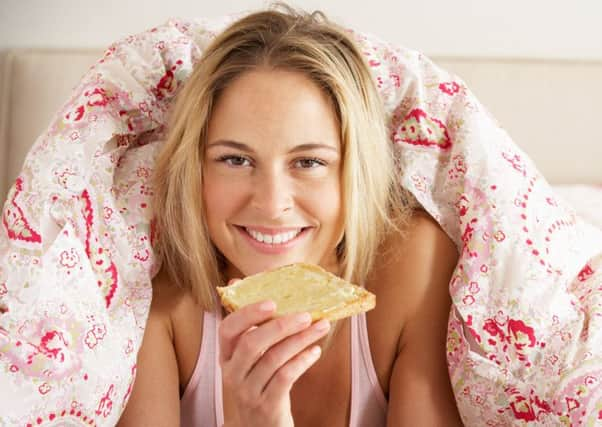Stephen Jardine: Colour of our toast is not a burning issue


On Monday I took my life in my hands. Ignoring expert advice splashed across the media that morning, I turned up the heat and enjoyed some extra brown toast. In a restaurant later that same day, I ordered a side dish of roast potatoes and requested they be extra crispy.
I did it because I could and because life is too short to listen to the latest paranoia from the miserable food police.
Advertisement
Hide AdAdvertisement
Hide AdAccording to the Food Standards Agency, bread and potatoes should only be cooked to a golden yellow colour rather than brown. That way, we reduce our intake of a chemical called acrylamide which is released at a certain temperature and which could cause cancer.
In the dictionary, the word ‘could’ indicates possibility and that is the problem here. According to the Professor of Public Understanding of Risk at Cambridge University, even adults with the highest consumption of acrylamide would need to consume 160 times more than their usual intake to reach a level that might cause increased tumours in mice.
“To be honest, I’m not convinced it is appropriate to launch a public campaign on this basis,” said Professor David Spiegelhalter.
Acrylamide is an issue for the food industry and manufacturers need to do everything they can to limit occurrence during industrial production, but is creating yet another food scare the best way to communicate with the general public?
The FSA has an important job to do, but in the haste to issue another press release, there is a risk consumers will become so blasé about the constant drip of doom that they will simply switch off and ignore all advice.
What matters is a proportionate response. Based on all the evidence, smoking is a very bad idea. Drinking coffee and eating bacon involves much less risk and you might decide the enjoyment it delivers is worth it. Giving up some things might help you live a longer life but if abstaining makes it feel longer too, some people might judge the risks are worth taking.
In a world of Trump, Isis and wayward Trident missiles, burnt toast is probably the least of our worries. A day after the FSA advice, another story added to that sense of what really matters.
As the implications of a Trump Presidency for our Brexit negotiations became clearer, Bob Young from the American Farm Bureau Federation appeared on BBC Radio 4 to say his members were ready to target the UK with farm exports as part of any trade deal.
Advertisement
Hide AdAdvertisement
Hide AdWhen pressed, he admitted this included cattle fed with growth hormones and chicken, which in the States is washed in a chlorine solution.
What are we going to do about that? According to the NFU spokesman who was interviewed next, we’d have to look at a level playing field in terms of allowing those practices here.
I don’t know about you but I would have burnt toast and golden roast potatoes every day of the week before I’d want to eat a chlorine washed chicken or beef raised faster than nature intended due to growth hormones.
That is the problem with the drip, drip, drip of food scare stories. While our attention is focused on the theoretical risk attached to things consumed in moderation, great big nasty threats are out there but being ignored.
Next week a new food campaign group will meet in Edinburgh. The Committee for the Defence of Artisan Food has been formed by some of the leading figures on the Scottish food scene to tackle the increasing use of questionable science in the name of food safety.
A lot is at stake here but consumer confidence is also on the line. We need to stop drifting from one food scare to another based on minimal, theoretical risks and concentrate on the big, real threats to healthy eating. They will do us much more damage than any piece of toast.